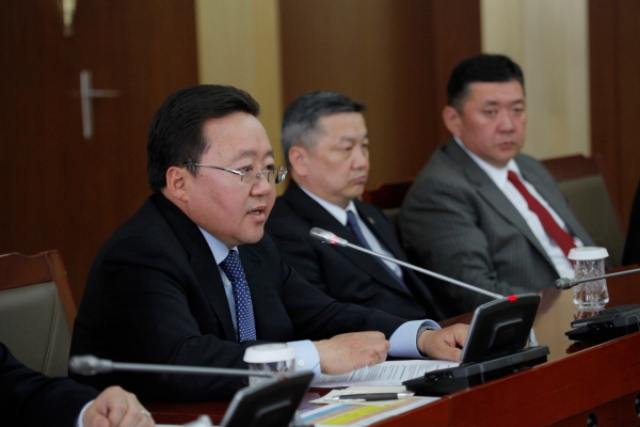ID :
372400
Thu, 06/25/2015 - 12:06
Auther :
Shortlink :
https://oananews.org//node/372400
The shortlink copeid
PRESIDENT ABOUT HIS AMENDMENTS TO LAW ON STATE SERVICE

Ulaanbaatar /MONTSAME/ The leader of Mongolia Ts.Elbegdorj Wednesday presented to the media his draft new wordings of the laws on the state service and on political party.
These drafts have been formulated in frames of the President’s policy and action program and within his “From big government to the Smart government” initiative.
Mr Elbegdorj is confident that these draft amendments will be vital to the political life and to solution of urgent problems facing Mongolia.
Firstly, the six principles must be kept in the state service as its professionalism, stability, complete separation from conflicts of interest and politics, openness, responsibility and control, and continuity. "Let's make appointments on a competitive basis, and promotions and rewarding--by taking into account the knowledge, skills, work experience, productivity and leadership qualities,” he said.
Secondly, the state service must be performed step by step, “no strangers must be allowed in”. For example, to achieve in 18-20 years a post of Secretary of State of a Ministry, head of an agency or governor of aimag and the city’s district, one must go through all the stages of the state service, spending four-five years for every step/level. This will not allow assign unwanted or unnecessary people".
Thirdly, “we must toughen the responsibility of state servants, to this will contribute a recently adopted general law on administration".
Fourthly, it is necessary that decisions of the Council of State Service are carried out rigorously, “a right to monitor the implementation of the decisions will be given to police or other authorities". If the decision is regarded wrong, one can apply to a court, he added. "I have also highlighted all the activities that a state employee is strictly forbidden to carry out, it is 19, for example, abuse of power, putting pressure on the other, claiming a compensation for the services, and so on”.
Fifthly, “we must completely separate the state service from the politics by avoiding such a situation when the lack of progress in the work of the party, which has the mandate of parliament, leads to a lack of progress in the work of the state, and vice versa".
Sixthly, it is necessary to stop the appointments and layoffs of state servants. "Following an example of other countries I want to introduce a ‘3+2’ principle, that is, when a new appointee--political state servant--can appoint three political officers that is his advisor, assistant and a press secretary, and two state administrative servants--a chauffeur or somebody more. That’s all, no more people can be touched,” he stressed.
At seventh, the new version proposes having “glass record” on state services operations, “let’s build an information network where all records are open to public about the attendance and results of the state service example, plus, information on warnings and responsibilities imposed by the State, and the observances of those responsibilities must be shared publicly.”
At eighth, the people are to be given the monitoring authority of the implementation of this law. “In other words, disputes within the state services will be settled by administrative court. This is currently a responsibility of the State Service Council”. “Citizens and media should enjoy a right to demand for status reports from any state authority on the implementation of the law”.
At ninth, the State Service Council itself must be more responsible, “this is the way it can impose the responsibility on others”.
“And the last one: I want to ban any amendments to this law within one year after parliamentary elections and an appointment of a Prime Minister, and within one year before parliamentary elections,” underlined Mr Elbegdorj.





